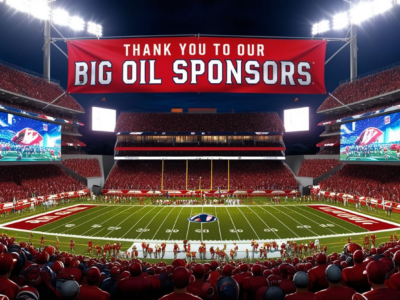Clean Ports Program Moves Ahead — A Little
 A few days ago, District Judge Christina Snyder issued her 57-page ruling in American Trucking Ass’n v. City of Los Angeles, the trade association’s challenge to the city’s clean ports program. The ruling gave the city a crucial victory, and it has more than local significance: if its reasoning is accepted, it could lead to similar labor-environmental coalition efforts throughout the country. But the reasoning will need to withstand review in the 9th Circuit.
A few days ago, District Judge Christina Snyder issued her 57-page ruling in American Trucking Ass’n v. City of Los Angeles, the trade association’s challenge to the city’s clean ports program. The ruling gave the city a crucial victory, and it has more than local significance: if its reasoning is accepted, it could lead to similar labor-environmental coalition efforts throughout the country. But the reasoning will need to withstand review in the 9th Circuit.
The clean ports program does two central things. First, it requires trucks that “dray” cargo from the port to other modes of land transport to retrofit to cleaner engines. As the decision notes, Port activities are responsible for 24% of the Diesel Particulate Matter, 11% of Nitrous Oxide, and 45% of Sulfur Oxide in the entirew South Coast Air Basin. The region simply cannot clean up its air to federal standards without reducing port emissions.
So who will pay for all of this?
That’s the second part of the program: through its “Concession Agreement,” the Port demanded that all trucks draying at the Port be operated by employees of the trucking companies, not through “independent contractors.” That means that the trucking companies will have to pay for the retrofits and — of political importance — employ the truckers, which means that the City can insist on their being unionized.
It hardly requires a transportation expert to see that the trucking companies, who prefer to hire “independent contractors” literally to do the dirty work, do not like this. So they sued, arguing that the Concession Agreement is pre-empted by the Federal Aviation Administration Authorizing Act (“FAAA”). Why would the FAAA pre-empt the program? Because it pre-empts all state or local regulation “relat[ing] to a price, route, or service of any motor carrier,” which the Concession Agreement would seem to implicate.
Without getting into too many of the legal details, Judge Snyder held that although the FAAA pre-empted the Concession Agreement, the statute contains an implicit “proprietary exemption” when the state or local regulation at issue is one that the state or local government is enacting in its capacity as a private market participant. Put another way, the FAAA pre-empts state or local regulations, not state or local governments acting like a business. And that makes sense: the statute is regulating governments, which have regulatory power, not businesses.
The touchstone here, and the place where the City’s position is at its weakest, is its proferred justification for why it insists on truckers being the employees. It argued that it wants them to be employees because then it only has to deal with a small number of trucking companies, in terms of clearing truckers and trucks for security purposes, environmental purposes, etc. That is plausible: one nice thing about hiring people who are already employees of another company is that you pay them a flat fee and they deal with all the regulator paperwork like benefits, workers’ comp, etc.
But everyone knows that a principal reason for the provision was not administrative convenience, but rather facilitate unionization. That might not fit under the proprietary exception because private businesses generally don’t have an interest in doing that. Judge Snyder very cleverly cited the administrative justification from the Ninth Circuit’s previous decision ordering her to preliminarily enjoin the Concession Agreement and Clean Ports program: how can the Ninth Circuit reject a justification that it itself endorsed?
Well, that depends upon the composition of the Ninth Circuit panel that gets this case on appeal. The panel that decided an earlier case on this issue tilted rightward but seemed to me basically non-ideological. I don’t know the Ninth Circuit’s rules on whether the same panel will consider this one, but if there is a different panel, we will have to recall Cohn’s Rule (named after Roy Cohn): “I don’t care what the law is; I want to know who the judge is.” So while the City, labor, and environmental groups are celebrating this one, if I were them, I wouldn’t break out the champagne just yet.
This might even be a cert-worthy case: it deals with a relatively pure question of law, and if it is upheld, ports around the country, controlled by union- and environment-friendly local governments, will rush in to follow. That will tell the Four Horseman on the Supremes that this is something they should take a closer look at.
Reader Comments
2 Replies to “Clean Ports Program Moves Ahead — A Little”
Comments are closed.







This decision will increase the cost of shipping cargo through any port in California and the west coast. This is good news for less expensive ports in Texas, Louisiana, Mississippi and Alabama. Pity the poor folks in California.
Since 2000, environmental activists in the San Pedro/Wilmington area have sought that the San Pedro Bay Ports (Los Angeles and Long Beach) use a concession model to manage port trucking, including a mandate to have trucking companies own their own trucking fleets and hire drives as employees. Our position had nothing to do with opening a door to unionization, nor Change to Win’s involvement which didn’t begin until 2006.
Instead, it had everything to do with long truck queues and inefficient operations in the ports, controlling truck routes and parking. We wanted to see a market mechanism in place that passed the true cost of providing trucking on, up the food chain, to shippers who control terminal operations and scheduling. The existing mechanism externalized through a deceptive flat rate mechanism in which drivers, who did not control when ships are loaded and unloaded, queued up competitively in long lines while neighborhoods endured the impacts of these lines with additional noise and pollution.
We proposed and helped passed legislation which limited truck queues on municipal streets, only to have the industry ignore our hopes to quiet down and clean up operations by moving those queues onto terminal property. Quite frankly, it was clear that the industry hardly gave a damn about the impact of their operations on our neighborhoods (or climate change).
Our position also has a lot to do with the sustainability of a clean trucks program—and creating a situation in which the industry itself can afford to pay for and maintain $100,000 new trucks instead of $10,000 old trucks—after an initial set of subsidies to ease the transition.
Our position on the value of changing the employment and truck ownership model used by port drayage companies was also backed up by an independent economic report. It is now held up by the reality on the road, where contract drivers are having even more trouble making ends meet under the old contract model with new environmental regulations put in place.
So, your observation “But everyone knows that a principal reason for the provision was not administrative convenience, but rather facilitate unionization” is not true at face value. Not everyone knows this—and not everyone agrees with this.